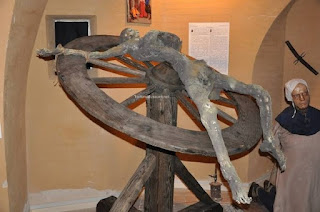Dorángel Vargas: The Harrowing Tale of Venezuela's "People Eater"
In so many cases of true crime, few stories are as chilling and macabre as that of Dorángel Vargas, infamously known as "The People Eater." This homeless man from Venezuela turned a tranquil park in San Cristobal into a hunting ground, preying on unsuspecting passersby. Between 1997 and 1999, Vargas confessed to killing and consuming at least eleven men, earning a notorious place in the dark history of serial killers. His story is a haunting reminder of the extreme depths of human depravity and the terrifying potential for violence that can lurk beneath the surface.
The Making of a Monster
Dorángel Vargas, born in 1957 in the remote regions of Venezuela, had a troubled and obscure early life. Little is known about his childhood or what led him down the path of cannibalism. What is clear, however, is that by the time he reached adulthood, Vargas was living on the fringes of society, homeless and struggling with severe mental health issues.
Vargas's life took a sinister turn when he made the park in San Cristobal his home. Isolated and desperate, he began targeting individuals who wandered into the area. His victims were typically young men, whom he would overpower and kill before dismembering their bodies and consuming their flesh.
The Gruesome Murders
Vargas's method was gruesome and methodical. He would stalk his victims, waiting for the opportune moment to strike. Once he had overpowered them, he would take them to his makeshift camp in the park. There, he would butcher their bodies, carefully separating the parts he intended to eat. In interviews following his capture, Vargas revealed his disturbing culinary preferences. He confessed to favoring the thighs and calf muscles, describing them as the "softest" parts of the human body.
The murders continued unchecked for nearly two years. Vargas's status as a homeless man allowed him to operate under the radar, and the isolated location of his crimes made it difficult for authorities to track the disappearances. During this time, he developed a reputation among the local homeless population, who dubbed him "El Comemuertos" or "The Dead-Eater."
Capture and Confession
Vargas's reign of terror came to an end in February 1999 when he was finally apprehended by Venezuelan authorities. The breakthrough came when human remains were discovered near his campsite, leading police to launch an investigation. Upon his arrest, Vargas readily confessed to his crimes, providing chilling details of his acts of cannibalism.
During his interrogation, Vargas displayed a shocking lack of remorse. He spoke candidly about his preference for human flesh and expressed no guilt for his actions. His confessions painted a horrifying picture of a man who had not only killed but had developed a ritualistic approach to his cannibalistic practices.
The Aftermath
The news of Vargas's arrest and his gruesome crimes sent shockwaves through Venezuela and the wider world. Media coverage of "The People Eater" was extensive, and the public was both horrified and morbidly fascinated by the details of his crimes. Vargas was quickly dubbed a monster, a symbol of unimaginable horror in the collective consciousness.
Vargas was declared legally insane and committed to a psychiatric hospital. His case raised significant questions about the treatment of mental illness and the failures of the social system that allowed such a disturbed individual to commit such heinous acts unchecked. Despite his incarceration, Vargas's story remains a chilling reminder of the darkest capabilities of human nature.
Societal and Psychological Implications
The case of Dorángel Vargas highlights several important issues, particularly the intersection of mental health, homelessness, and crime. Vargas's actions were not those of a rational mind but rather the result of severe mental illness left untreated. His ability to live undetected for so long in the park speaks to a broader issue of societal neglect of the most vulnerable populations.
Psychologically, Vargas fits the profile of a deeply disturbed individual whose actions were driven by a combination of extreme desperation and delusion. Cannibalism, while rare, has been documented in other cases of severe mental illness, often linked to psychotic breaks or deeply ingrained survival mechanisms in situations of extreme deprivation.
A Haunting Legacy
Dorángel Vargas's story is one that continues to fascinate and horrify in equal measure. His nickname, "The People Eater," ensures that his crimes will be remembered as among the most grotesque in criminal history. For Venezuela, his case remains a dark chapter, a reminder of the fragility of social safety nets and the dire consequences when they fail.
In the years since his capture, Vargas has become a subject of study for criminologists and psychologists seeking to understand the motivations behind such extreme acts. His case is often cited in discussions about the importance of mental health intervention and the need for comprehensive support systems for the homeless and mentally ill.
Conclusion
Dorángel Vargas's descent into cannibalism and murder is a stark reminder of the depths of human depravity and the critical importance of mental health care and social support. His actions, driven by a combination of desperation and mental illness, led to one of the most horrifying crime sprees in Venezuelan history. As we reflect on his story, it serves as a powerful call to action to address the underlying issues that can lead to such tragic outcomes and to ensure that no one falls through the cracks of society's safety nets.




Comments
Post a Comment